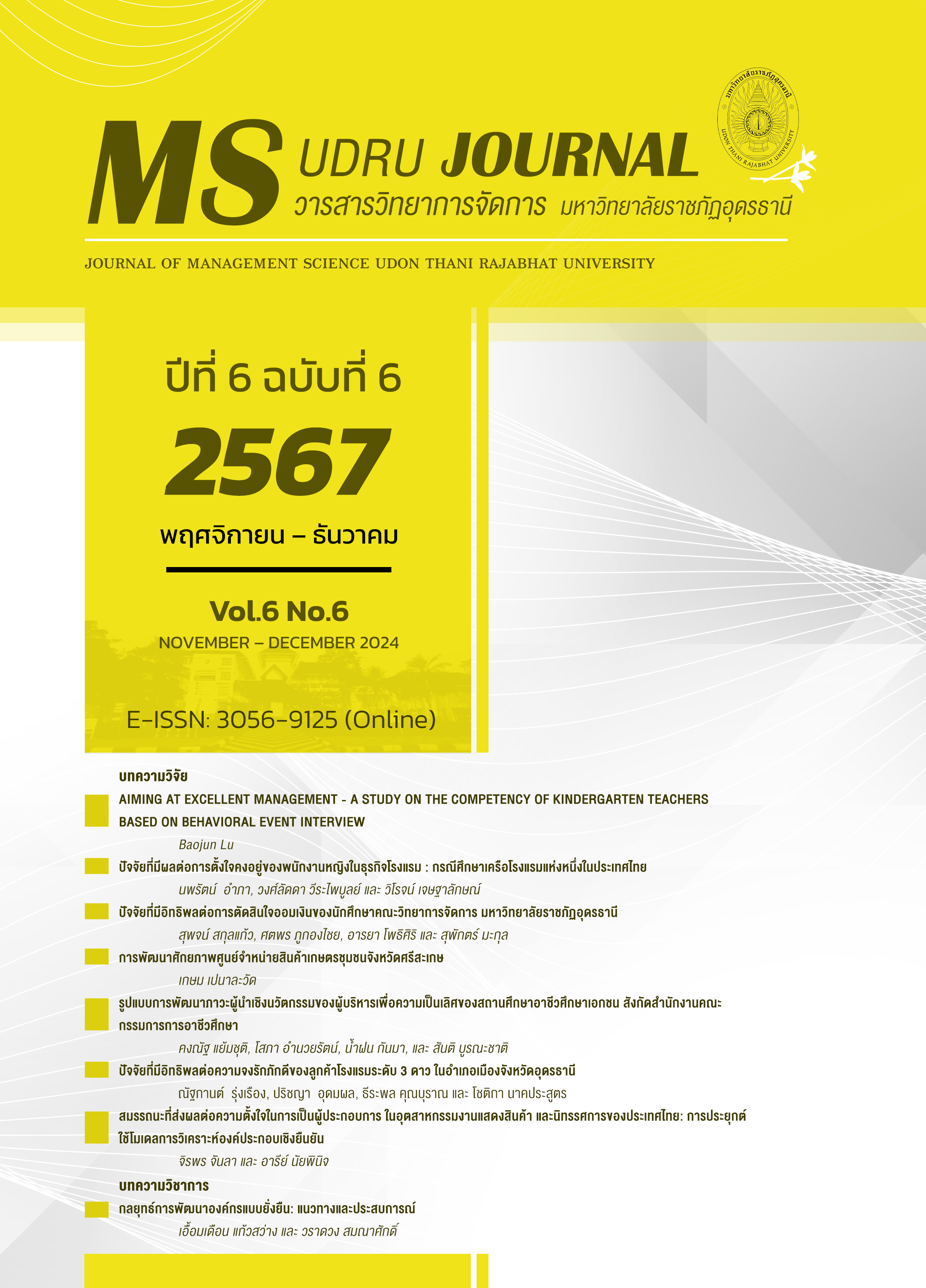SUSTAINABLE ORGANIZATIONAL DEVELOPMENT STRATEGIES: APPROACHES AND EXPERIENCES
Main Article Content
Abstract
The adaptation and evolution of organizations to ensure survival and sustainable growth in the face of escalating social and environmental issues is a paramount concern that all entities must consider. This article examines the fundamentals of sustainable organizational growth methods, emphasizing the integration of economic, social, and environmental dimensions. The study analyzes successful firms as case studies, providing insights and expertise that can assist other organizations in formulating and executing effective sustainable development strategies. The findings emphasize that a clear vision, employee engagement at all levels, and the use of innovation and technology, together with excellent planning and management, are essential for accomplishing sustainable organizational development. The equilibrium among economic, social, and environmental dimensions is crucial. Organizations must effectively manage their financial resources and internal expertise while promoting employee development and establishing external relationships, such as business alliances and resource sharing, to stimulate economic growth and ensure long-term stability. Moreover, employing innovation and technology to enhance corporate operations and supplement sales is an essential tactic. This article offers essential instructions for CEOs and organizational leaders aiming to direct their organizations toward sustainable growth, a crucial method for achieving long-term success and stability in contemporary times.
Article Details

This work is licensed under a Creative Commons Attribution-NonCommercial-NoDerivatives 4.0 International License.
บทความที่ได้รับการตีพิมพ์เป็นลิขสิทธิ์ของคณะวิทยาการจัดการ มหาวิทยาลัยราชภัฏอุดรธานี
ข้อความที่ปรากฏในบทความแต่ละเรื่องในวารสารวิชาการเล่มนี้ ไม่ใช่ความคิดเห็นและความรับผิดชอบของผู้จัดทำ บรรณาธิการ กองบรรณาธิการ และคณะวิทยาการจัดการ มหาวิทยาลัยราชภัฏอุดรธานี ความรับผิดชอบด้านเนื้อหาและการตรวจร่างบทความแต่ละเรื่องเป็นความคิดเห็นของผู้เขียนบทความแต่ละท่าน
References
ธนาคารกสิกรไทย จำกัด (มหาชน). (2565). ธนาคารแห่งความยั่งยืน รายงานการพัฒนาเพื่อความยั่งยืน 2565. กรุงเทพฯ: พญาไท.
บริษัทปูนซีเมนต์ไทย จำกัด (มหาชน). (2564). กรอบการพัฒนาอย่างยั่งยืน เอสซีจี. กรุงเทพฯ: บางซื่อ.
บริษัท โตโยต้า มอเตอร์ ประเทศไทย จำกัด. (2564). Environmental Report 2021. สมุทรปราการ: พระประแดง.
พิริยาภรณ์ อันทอง และศุภกร เอกชัยไพบูลย์. (2559). Checklist พิชิตธุรกิจยั่งยืน เครื่องมือการขับเคลื่อนองค์กรสู่ความยั่งยืน สำหรับธุรกิจที่เพิ่งเริ่มต้นพัฒนาความยั่งยืนในองค์กร. กรุงเทพฯ : ศูนย์พัฒนาความรับผิดชอบต่อสังคม ตลาดหลักทรัพย์แห่งประเทศไทย.
Barbier, E.B. (1987). The concept of sustainable economic development. Environmental Conservation, 14(2), 101-110.
Cepraga, L., & Bîrsan, S. (2023). Approaching Organizational Identity from the Perspective of Sustainable Development. https://doi.org/10.53486/icspm2022.36.
Chams, N., & García-Blandón, J. (2019). On the Importance of Sustainable Human Resource Management for the Adoption of Sustainable Development Goals. Resources, Conservation and Recycling, 141, 109-122. https://doi.org/10.1016/j.resconrec.2018.10.006.
Cho, H., Lee, P., & Shin, C. (2019). Becoming a Sustainable Organization: Focusing on Process, Administrative Innovation and Human Resource Practices. Sustainability, 11, 3554. https://doi.org/10.3390/su11133554.
Dzhengiz T., Riandita A., Broström A. (2023). Configurations of sustainability-oriented textile partnerships. Business Strategy and the Environment, 4392-4412. https://doi.org/10.1002/bse.3372.
Gutterman, A. (2020). Organizational Culture and Sustainability. In Managing Sustainability: A Guide for Executives. https://doi.org/10.4324/9781003055440-11.
Hammadi, F., & Hussain, M. (2019). Sustainable organizational performance: A study of health-care organizations in the United Arab Emirates. International Journal of Organizational Analysis, 27(1), 169-186. https://doi.org/10.1108/IJOA-10-2017-1263.
Long, B. S. (2019). Strategic sustainability: Creating business advantage in the new reality. World Scientific.
Matu, B. J. (2024). The importance of incorporating lived experience and identity in promoting cultural diversity and sustainability in community college and education: a case study of Community College of Allegheny County. International Journal of Sustainability in Higher Education, 25(3), 470-488.
Morandín-Ahuerma, I., Contreras-Hernández, A., Ayala-Ortiz, D. A., Pérez-Maqueo, O. (2019). Socio–Ecosystemic Sustainability. Sustainability, 11(12), 3354. https://doi.org/10.3390/su11123354.
Obrenovic, B., Du, J., Godinic, D., Tsoy, D., & Khudaykulov, A. (2020). Sustaining enterprise operations and productivity during the COVID-19 pandemic: "Enterprise Effectiveness and Sustainability Model". Sustainability, 12, 5981. https://doi.org/10.3390/su12155981.
Orth, R., Kohl, H., & Galeitzke, M. (2020). Sustainable Corporate Development: A Resource-Oriented Approach. In Freitag M., Kotzab H., Pannek J. (eds) Dynamics in Logistics. Lecture Notes in Logistics. Springer, Cham. https://doi.org/10.1007/978-3-030-40390-4_12.
Patagonia. (2020). Annual Benefit Corporation Report. https://www.patagonia.com/on/demandware.static/-/Library-Sites-PatagoniaShared/default/dwf14ad70c/PDF-US/PAT_2019_BCorp_Report.pdf.
Tseng, M. L., Chen, K. L., & Nguyen, T. T. (2022). Enhancing firm value through strategic alignment of circular economy and sustainable supply chain management practices under uncertainty. Resources, Conservation and Recycling, 180, 106181. https://doi.org/10.1016/j.resconrec.2021.106181.
Unilever. (2021). Unilever Annual Report and Accounts 2020. https://www.unilever.com/Images/annual-report-and-accounts-2020_tcm244-559824_en.pdf.
van Zanten, J., & van Tulder, R. (2021). Improving companies' impacts on sustainable development: A nexus approach to the SDGS. Business Strategy and the Environment, 30, 3703-3720. https://doi.org/10.1002/bse.2835.


